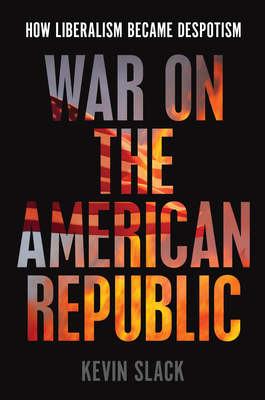War on the American Republic: How Liberalism Became Despotism

War on the American Republic: How Liberalism Became Despotism
Americans often use the words progressive, liberal, and radical more or less interchangeably without understanding their place in American history. Kevin Slack describes the distinct aims of the movements they represent and weighs their consequences for the American republic.Each of the three movements rejected older republican principles of governance in favor of an administrative state, but there were substantial differences between Teddy Roosevelt's Anglo-Protestant progressive social gospelers, who battled trusts and curbed immigration; Franklin Roosevelt's and Lyndon Johnson's secular liberals, who forged a government-business partnership and promoted a civil rights agenda; and the 1960s radicals, who protested corporate influence in the Great Society, liberal hypocrisy on race and gender, and the war in Vietnam. Each sought to overturn what came before. Following the revolution of the 1960s, elites on both left and right turned against the industrial middle class to erect an oligarchy at home and advance globalization abroad. Each side claimed to serve the interests of disadvantaged or underrepresented groups. Radicals ensconced themselves in bureaucracy and academia to advance their vision of social justice for women and minorities, while neoliberal elites promoted monopoly finance, open borders, and the outsourcing of jobs to benefit consumers. The administrative state became a global American empire, but the neoliberals' economic and military failures precipitated a crisis of legitimacy. In the "great awokening" that began under Barack Obama, neoliberal elites, including establishment conservatives, openly broke with the populist base of the Republican Party, embraced identity politics, and used COVID-19 and a myth of insurrection to strip away the rights of American citizens. Today, an incompetent kleptocracy is draining the wealthiest and most powerful people in history, thus eroding the foundations of its own empire.
PRP: 216.94 Lei
Acesta este Prețul Recomandat de Producător. Prețul de vânzare al produsului este afișat mai jos.
195.25Lei
195.25Lei
216.94 LeiIndisponibil
Descrierea produsului
Americans often use the words progressive, liberal, and radical more or less interchangeably without understanding their place in American history. Kevin Slack describes the distinct aims of the movements they represent and weighs their consequences for the American republic.Each of the three movements rejected older republican principles of governance in favor of an administrative state, but there were substantial differences between Teddy Roosevelt's Anglo-Protestant progressive social gospelers, who battled trusts and curbed immigration; Franklin Roosevelt's and Lyndon Johnson's secular liberals, who forged a government-business partnership and promoted a civil rights agenda; and the 1960s radicals, who protested corporate influence in the Great Society, liberal hypocrisy on race and gender, and the war in Vietnam. Each sought to overturn what came before. Following the revolution of the 1960s, elites on both left and right turned against the industrial middle class to erect an oligarchy at home and advance globalization abroad. Each side claimed to serve the interests of disadvantaged or underrepresented groups. Radicals ensconced themselves in bureaucracy and academia to advance their vision of social justice for women and minorities, while neoliberal elites promoted monopoly finance, open borders, and the outsourcing of jobs to benefit consumers. The administrative state became a global American empire, but the neoliberals' economic and military failures precipitated a crisis of legitimacy. In the "great awokening" that began under Barack Obama, neoliberal elites, including establishment conservatives, openly broke with the populist base of the Republican Party, embraced identity politics, and used COVID-19 and a myth of insurrection to strip away the rights of American citizens. Today, an incompetent kleptocracy is draining the wealthiest and most powerful people in history, thus eroding the foundations of its own empire.
Detaliile produsului










